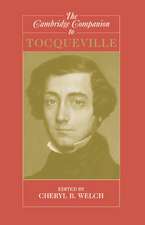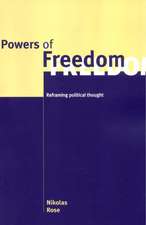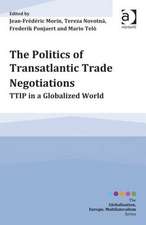Politics in Dark Times: Encounters with Hannah Arendt
Editat de Seyla Benhabiben Limba Engleză Paperback – 24 oct 2010
| Toate formatele și edițiile | Preț | Express |
|---|---|---|
| Paperback (1) | 205.40 lei 3-5 săpt. | |
| Cambridge University Press – 24 oct 2010 | 205.40 lei 3-5 săpt. | |
| Hardback (1) | 651.51 lei 6-8 săpt. | |
| Cambridge University Press – 24 oct 2010 | 651.51 lei 6-8 săpt. |
Preț: 205.40 lei
Nou
Puncte Express: 308
Preț estimativ în valută:
39.30€ • 41.12$ • 32.65£
39.30€ • 41.12$ • 32.65£
Carte disponibilă
Livrare economică 13-27 martie
Preluare comenzi: 021 569.72.76
Specificații
ISBN-13: 9780521127226
ISBN-10: 052112722X
Pagini: 408
Dimensiuni: 164 x 233 x 22 mm
Greutate: 0.59 kg
Editura: Cambridge University Press
Colecția Cambridge University Press
Locul publicării:New York, United States
ISBN-10: 052112722X
Pagini: 408
Dimensiuni: 164 x 233 x 22 mm
Greutate: 0.59 kg
Editura: Cambridge University Press
Colecția Cambridge University Press
Locul publicării:New York, United States
Cuprins
1. Introduction Seyla Benhabib; Part I. Freedom, Equality, and Responsibility: 2. Arendt on the foundations of equality Jeremy Waldron; 3. Arendt's Augustine Roy T. Tsao; 4. The rule of the people: Arendt, archê, and democracy Patchen Markell; 5. Genealogies of catastrophe: Arendt on the logic and legacy of imperialism Karuna Mantena; 6. On race and culture: Hannah Arendt and her contemporaries Richard H. King; Part II. Sovereignty, the Nation-State and the Rule of Law: 7. Banishing the sovereign? Internal and external sovereignty in Arendt Andrew Arato and Jean Cohen; 8. The decline of order: Hannah Arendt and the paradoxes of the nation-state Christian Volk; 9. The Eichmann trial and the legacy of jurisdiction Leora Bilsky; 10. International law and human plurality in the shadow of totalitarianism: Hannah Arendt and Raphael Lemkin Seyla Benhabib; Part III. Politics in Dark Times: 11. In search of a miracle: Hannah Arendt and the atomic bomb Jonathan Schell; 12. Hannah Arendt between Europe and America: optimism in dark times Benjamin R. Barber; 13. Keeping the republic: reading Arendt's On Revolution after the fall of the Berlin Wall Dick Howard; Part IV. Judging Evil: 14. Are Arendt's reflections on evil still relevant? Richard Bernstein; 15. Banality reconsidered Susan Neiman; 16. The elusiveness of Arendtian judgment Bryan Garsten; 17. Existential values in Arendt's treatment of evil and morality George Kateb.
Recenzii
“Dark times demand clear understanding, not false optimism. Few thinkers offer greater resources than Hannah Arendt for illuminating the darkness. The essays in this fine collection bring out both the clear foundations and the sometimes ambiguous nuances of Arendt’s thought. They help us think better in a troubled era that desperately needs careful, historically-informed, and hard-headed analysis.”
—Craig Calhoun, Social Science Research Council and New York University
“Written by both established and up-and-coming scholars, the innovative essays collected in this important volume reflect the depth and breadth of the thinker at their center. The reception of Hannah Arendt’s work has changed profoundly in the years since Seyla Benhabib began working on her: from a nearly exclusive focus in the US context on The Human Condition, scholarly attention has shifted to The Origins of Totalitarianism, Eichmann in Jerusalem and Arendt’s ‘Jewish writings.’ The result? A thinker who is as much public intellectual as political theorist, and whose topics are both urgently timely and timeless, as indicated by this volume’s well-chosen focus on equality, sovereignty, the rule of law, the politics of judgment, evil and courage in Arendt’s thought.”
—Bonnie Honig, Northwestern University and American Bar Foundation, Chicago
“Amidst the abundant writings on Hannah Arendt, Politics in Dark Times deserves a niche of its own. Every one of these essays is probing, discriminating, and thoughtful. Looked at as a whole, they underscore the salience of Arendt’s thought in elucidating such distinct yet linked political issues as human freedom and the limits of human action; political equality and its counterpart, political responsibility; ruling, the rule of law, and being ruled; nationalism, imperialism, and racism; the nation-state and the paradox of human rights; internal and external state sovereignty; popular sovereignty in a republican democracy; territorial versus universal jurisdiction in the prosecution of crimes against humanity; genocide, Jihadism, and totalitarianism; the motiveless crime of a desk-murderer; the intelligibility of banal evil; and the activity of a political spectator or judge. To encounter Arendt as a living presence among these speakers cannot but benefit all students of her thought.”
—Jerome Kohn, The New School for Social Research
“The essays in Politics in Dark Times range across a wide variety of topics—from democratic theory, political action, and ideas of sovereignty to international law, the roots of imperialism and the causes of genocide. The level of scholarship is consistently high, and all the contributions are illuminating. More than a few of the essays promise to become classics in their own right. When it comes to bringing Hannah Arendt’s thought into dialogue with the some of the most pressing political issues of our time, Politics in Dark Times succeeds brilliantly.”
—Dana Villa, Packey Dee Professor of Political Theory, University of Notre Dame
—Craig Calhoun, Social Science Research Council and New York University
“Written by both established and up-and-coming scholars, the innovative essays collected in this important volume reflect the depth and breadth of the thinker at their center. The reception of Hannah Arendt’s work has changed profoundly in the years since Seyla Benhabib began working on her: from a nearly exclusive focus in the US context on The Human Condition, scholarly attention has shifted to The Origins of Totalitarianism, Eichmann in Jerusalem and Arendt’s ‘Jewish writings.’ The result? A thinker who is as much public intellectual as political theorist, and whose topics are both urgently timely and timeless, as indicated by this volume’s well-chosen focus on equality, sovereignty, the rule of law, the politics of judgment, evil and courage in Arendt’s thought.”
—Bonnie Honig, Northwestern University and American Bar Foundation, Chicago
“Amidst the abundant writings on Hannah Arendt, Politics in Dark Times deserves a niche of its own. Every one of these essays is probing, discriminating, and thoughtful. Looked at as a whole, they underscore the salience of Arendt’s thought in elucidating such distinct yet linked political issues as human freedom and the limits of human action; political equality and its counterpart, political responsibility; ruling, the rule of law, and being ruled; nationalism, imperialism, and racism; the nation-state and the paradox of human rights; internal and external state sovereignty; popular sovereignty in a republican democracy; territorial versus universal jurisdiction in the prosecution of crimes against humanity; genocide, Jihadism, and totalitarianism; the motiveless crime of a desk-murderer; the intelligibility of banal evil; and the activity of a political spectator or judge. To encounter Arendt as a living presence among these speakers cannot but benefit all students of her thought.”
—Jerome Kohn, The New School for Social Research
“The essays in Politics in Dark Times range across a wide variety of topics—from democratic theory, political action, and ideas of sovereignty to international law, the roots of imperialism and the causes of genocide. The level of scholarship is consistently high, and all the contributions are illuminating. More than a few of the essays promise to become classics in their own right. When it comes to bringing Hannah Arendt’s thought into dialogue with the some of the most pressing political issues of our time, Politics in Dark Times succeeds brilliantly.”
—Dana Villa, Packey Dee Professor of Political Theory, University of Notre Dame
Descriere
This collection explores Hannah Arendt's thought against the background of recent world-political events.











